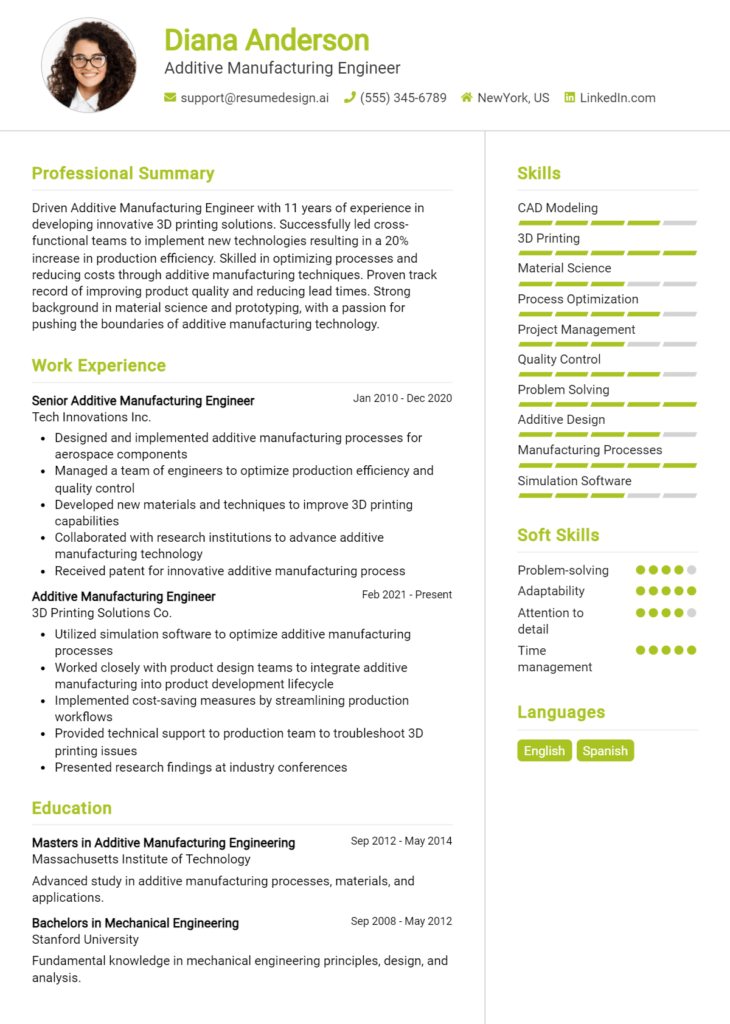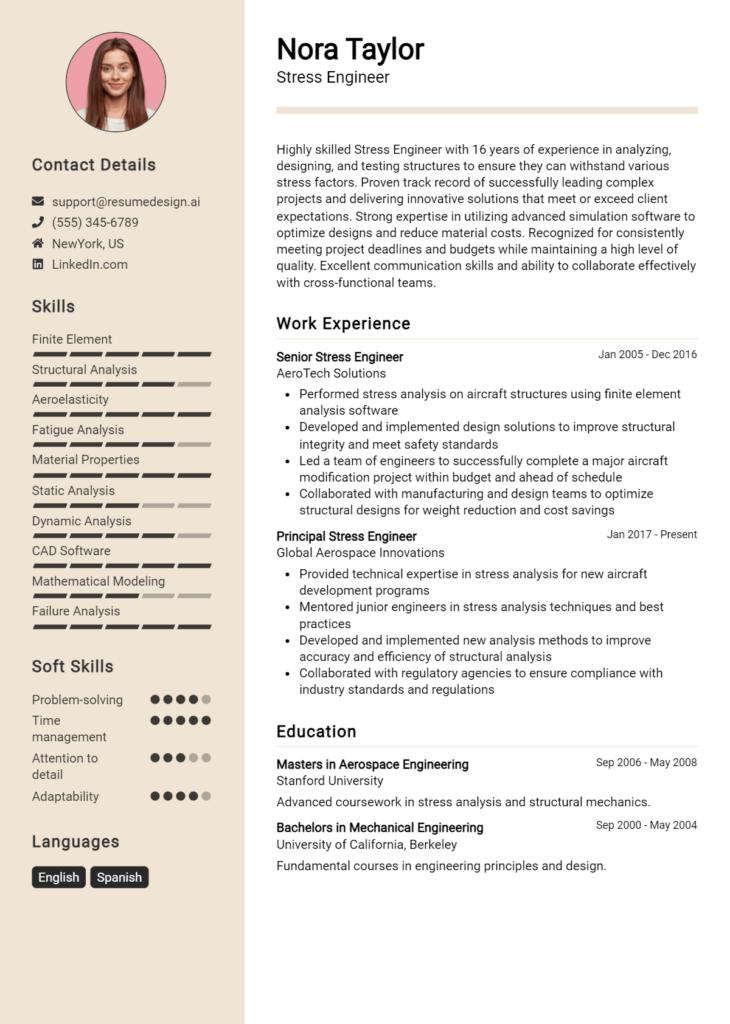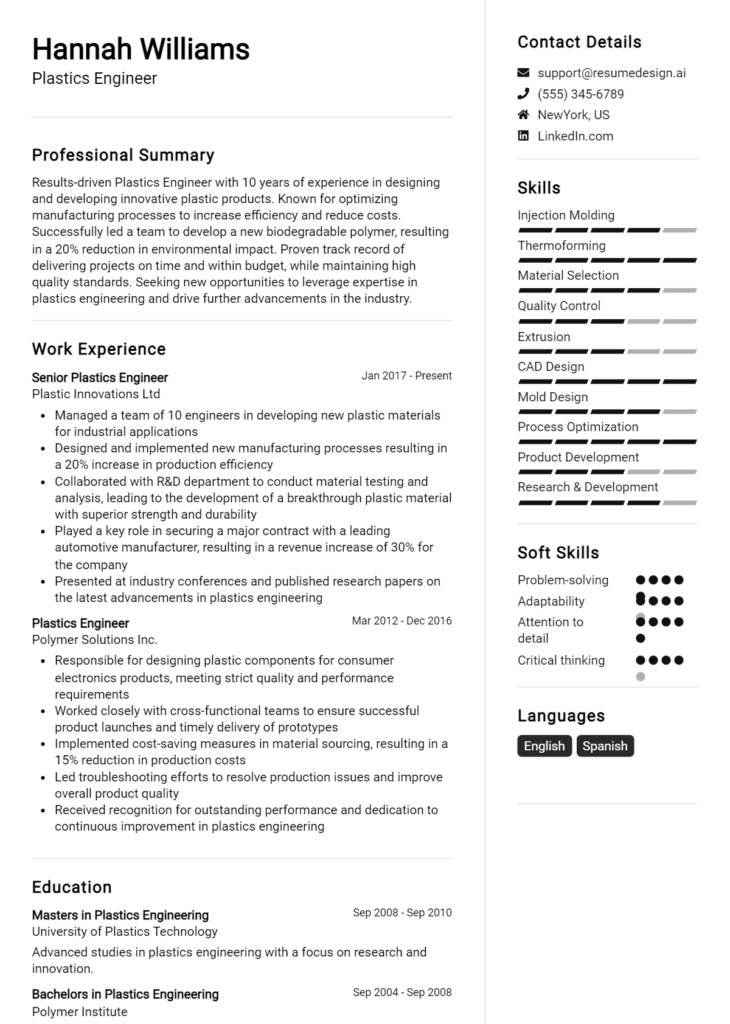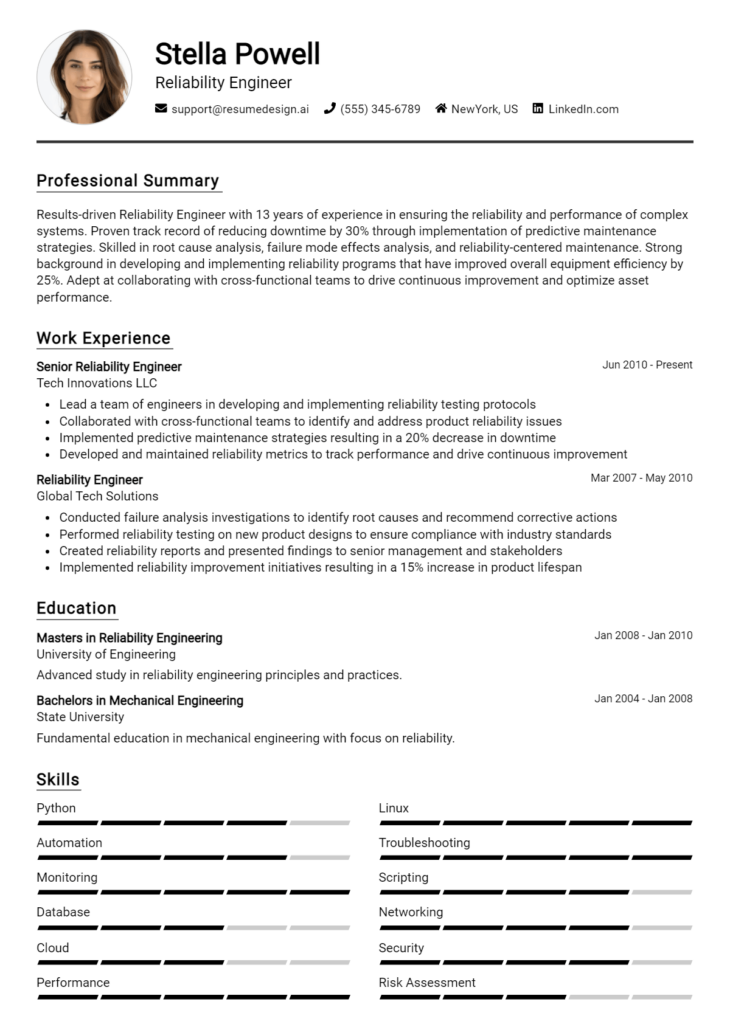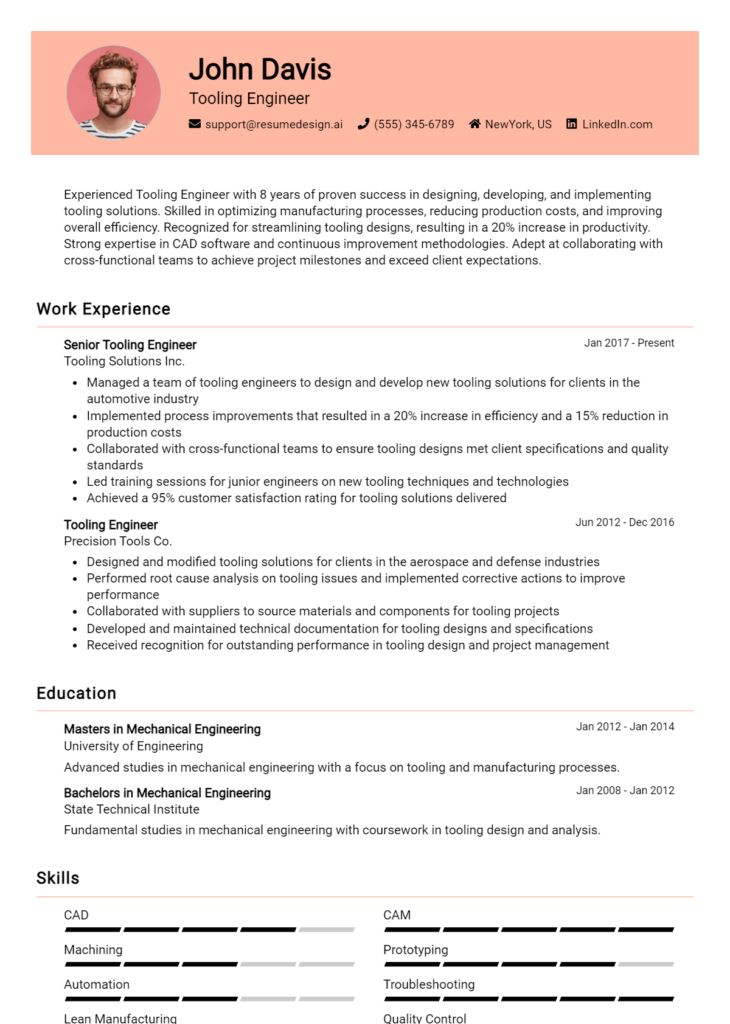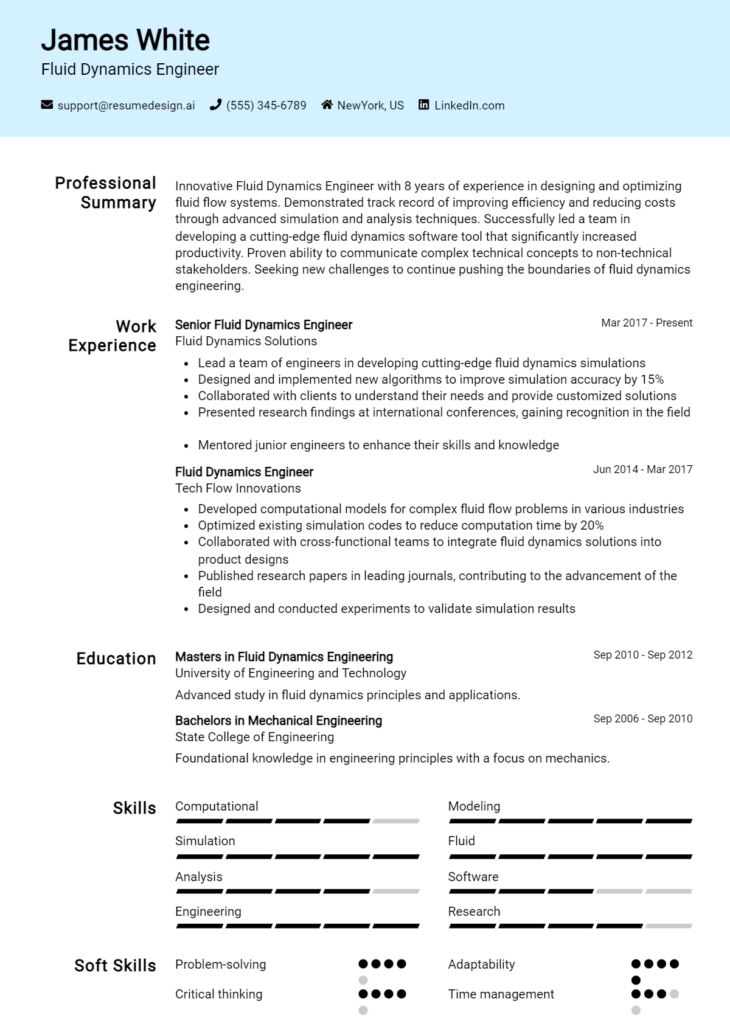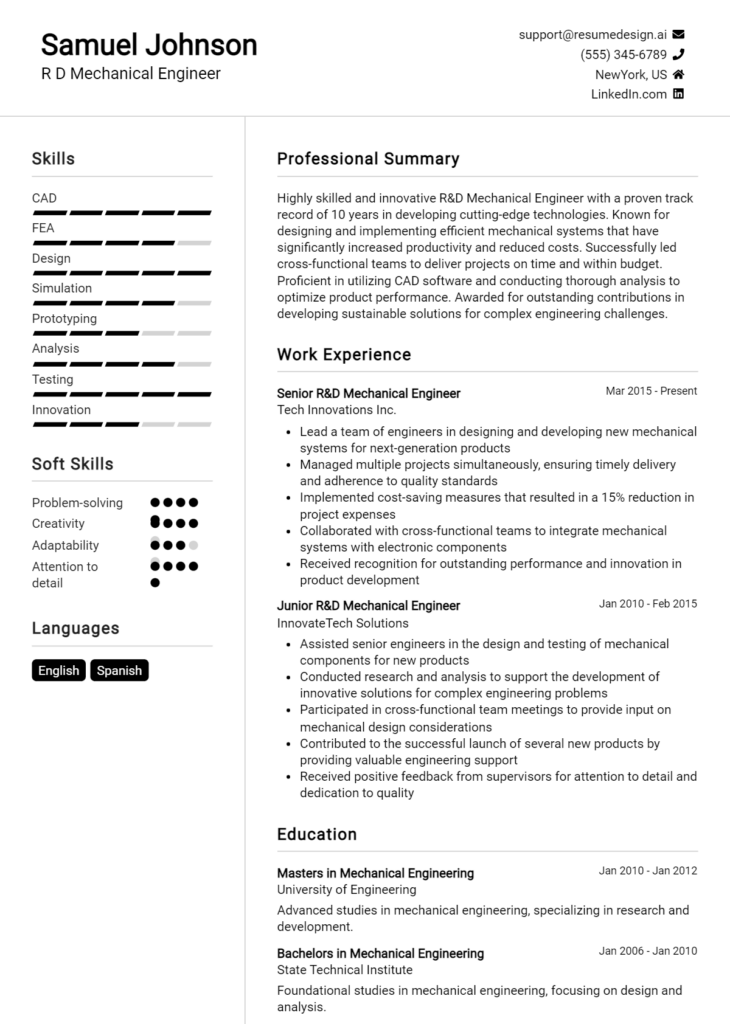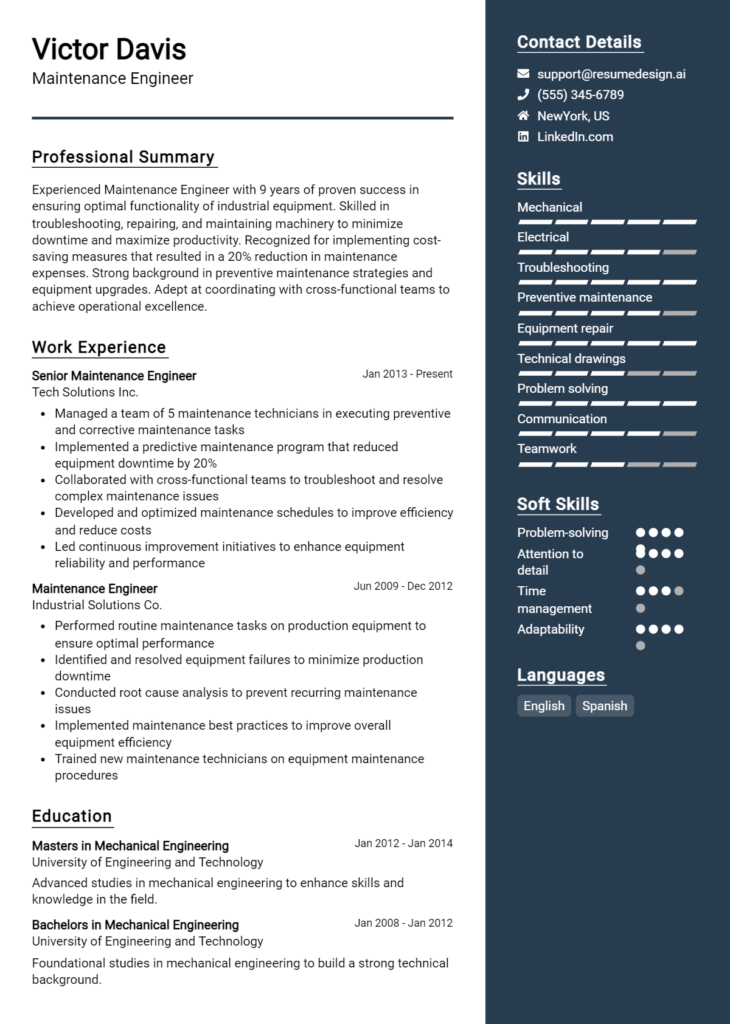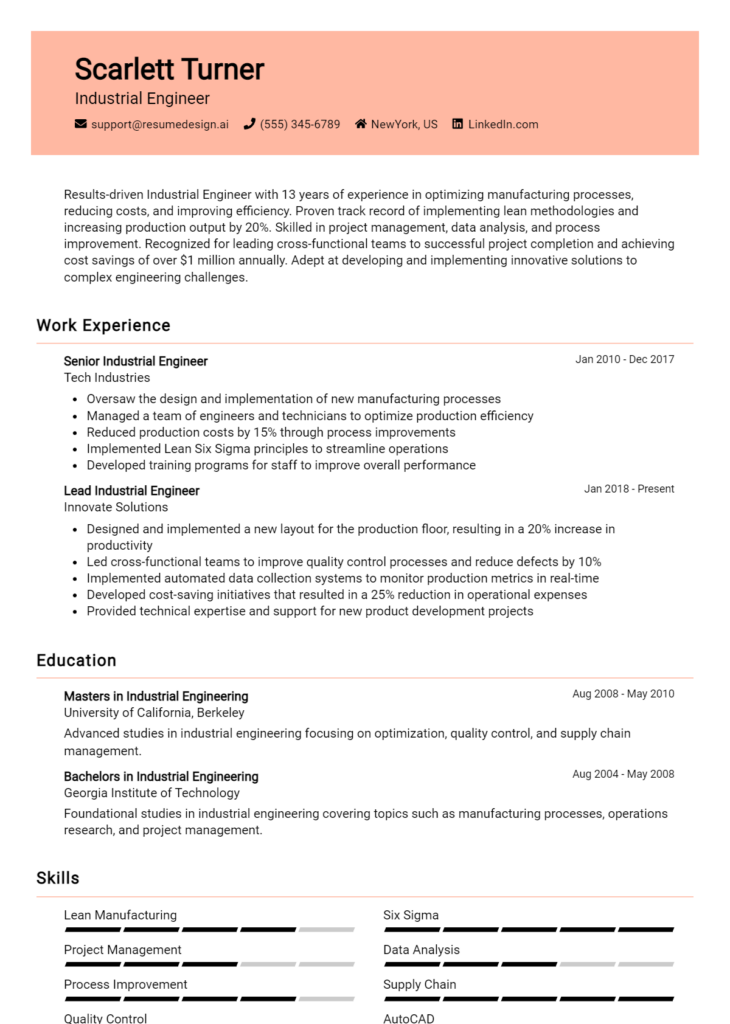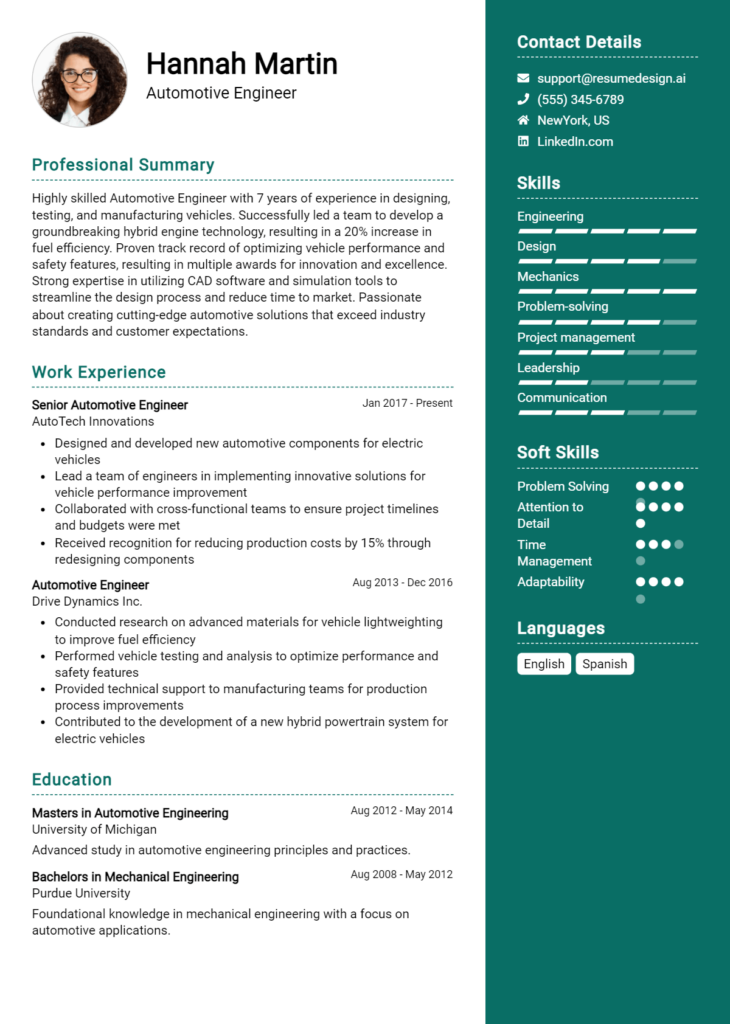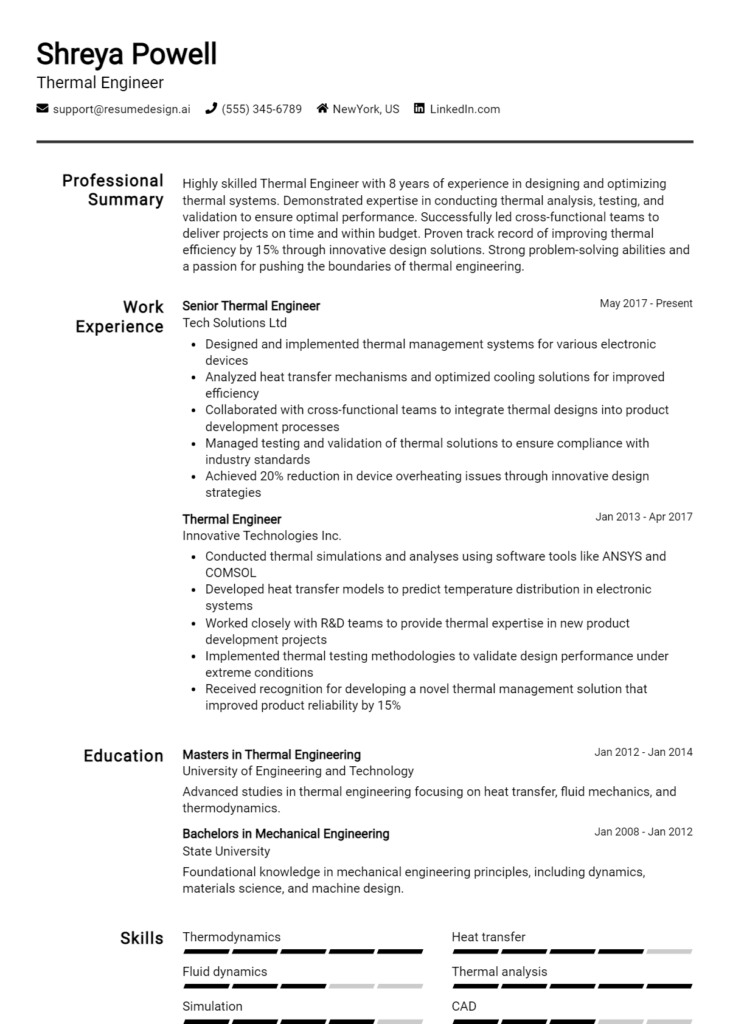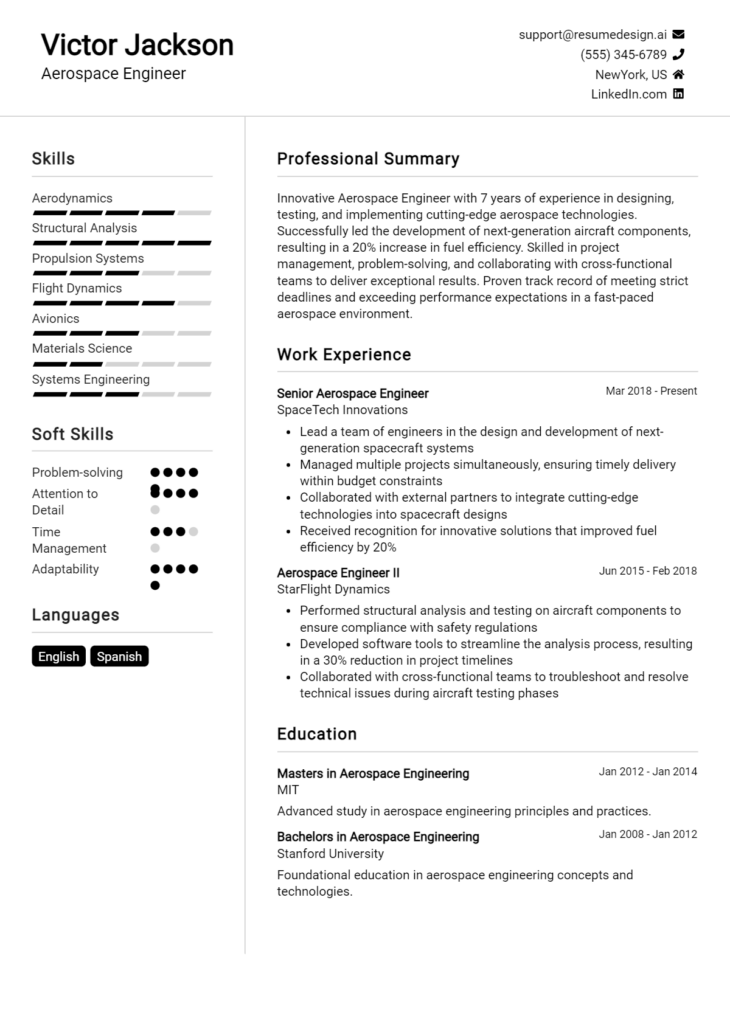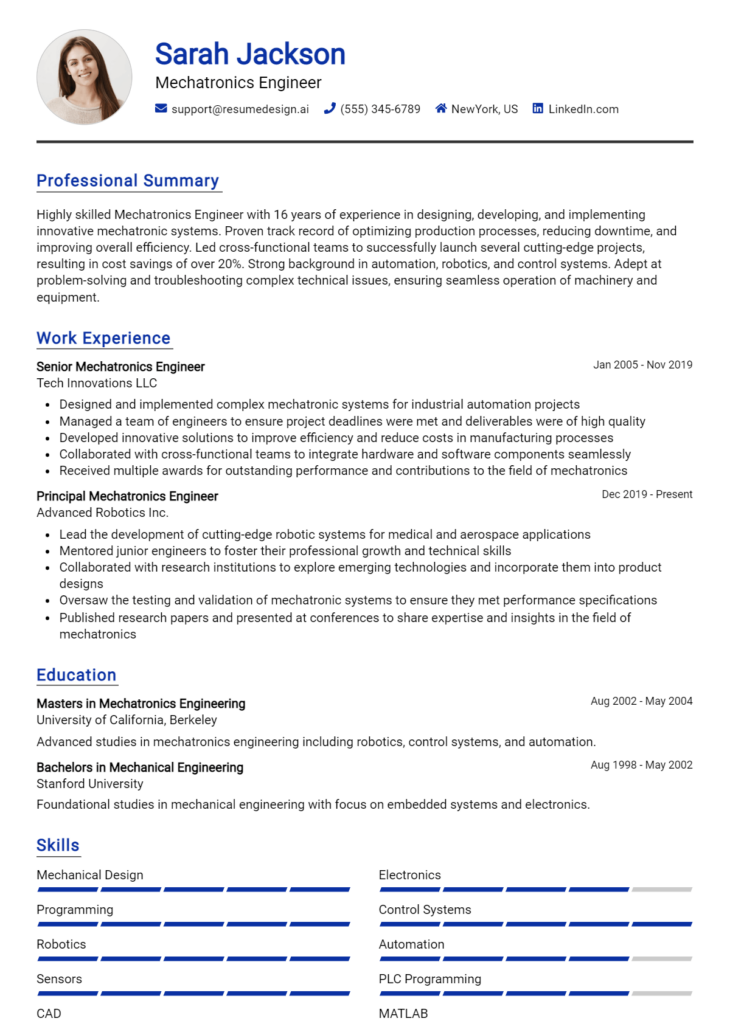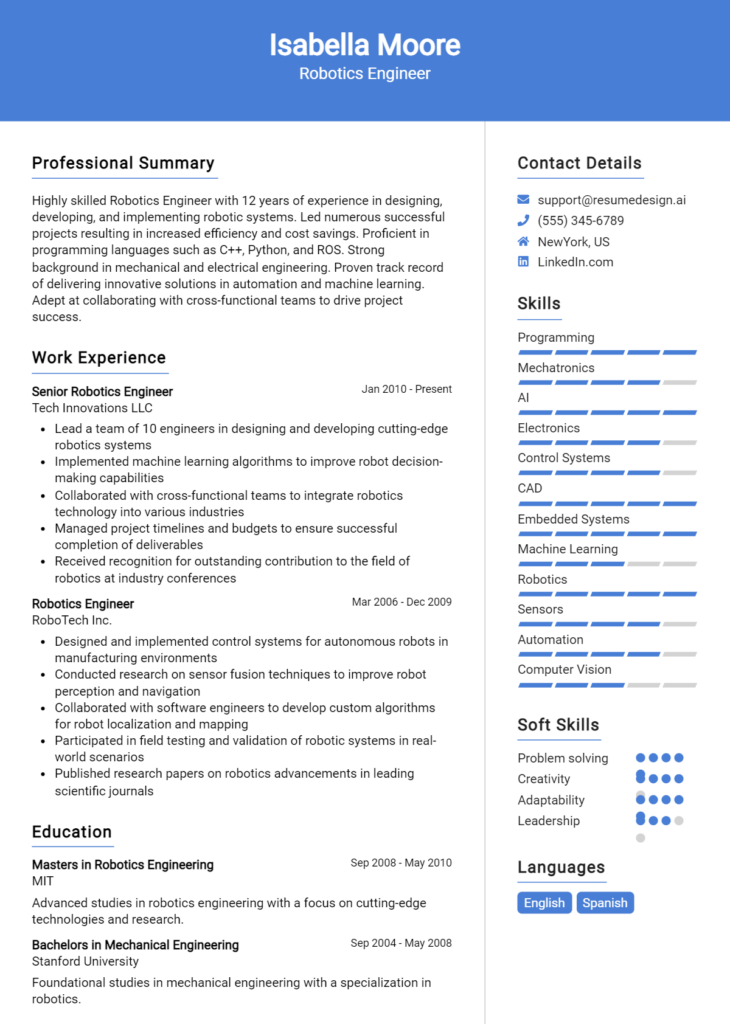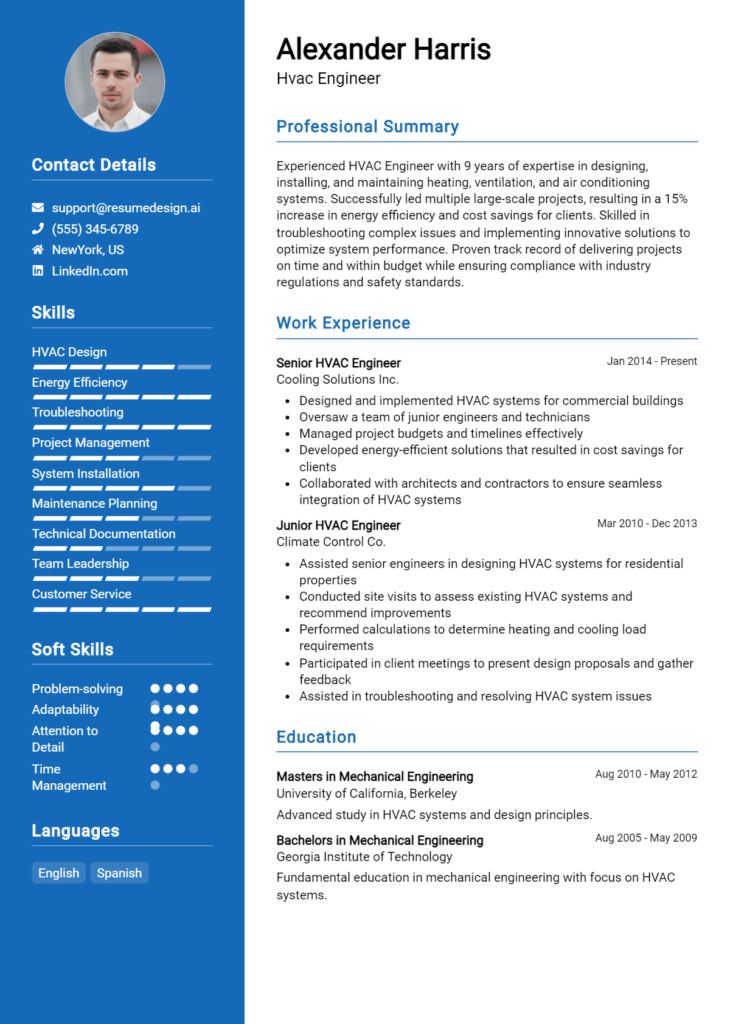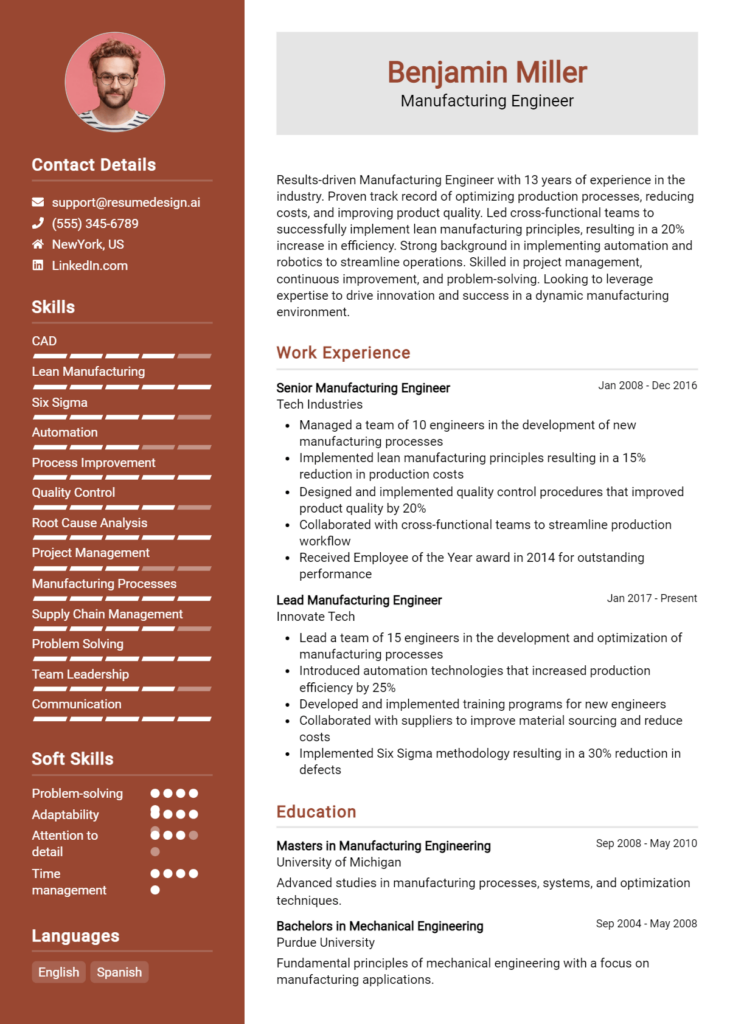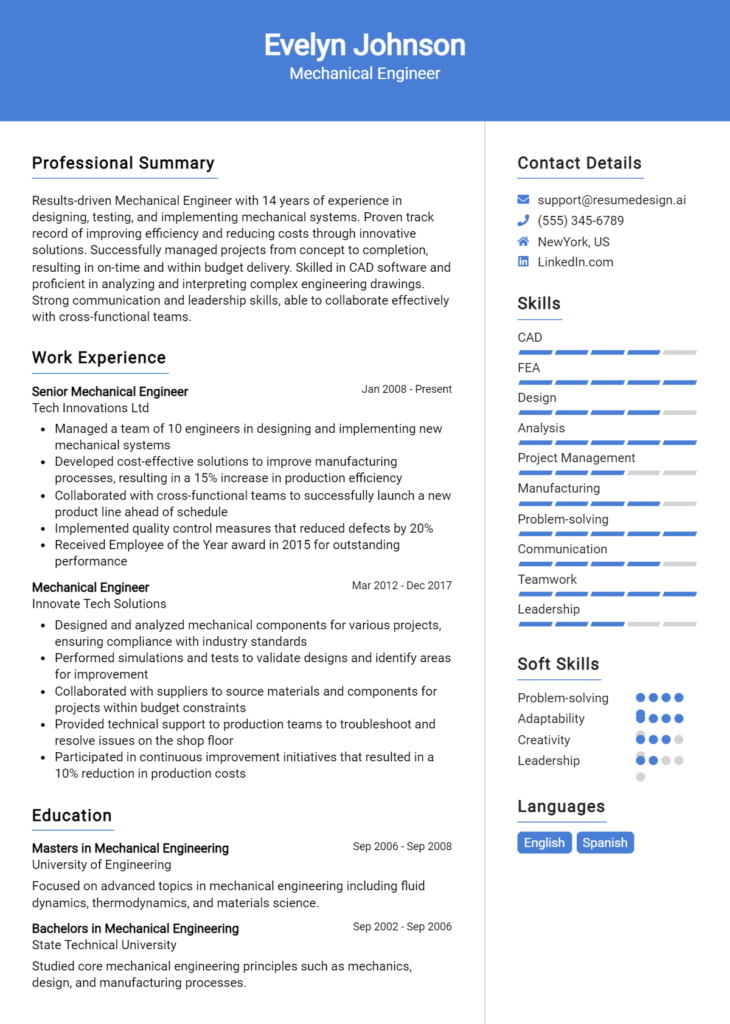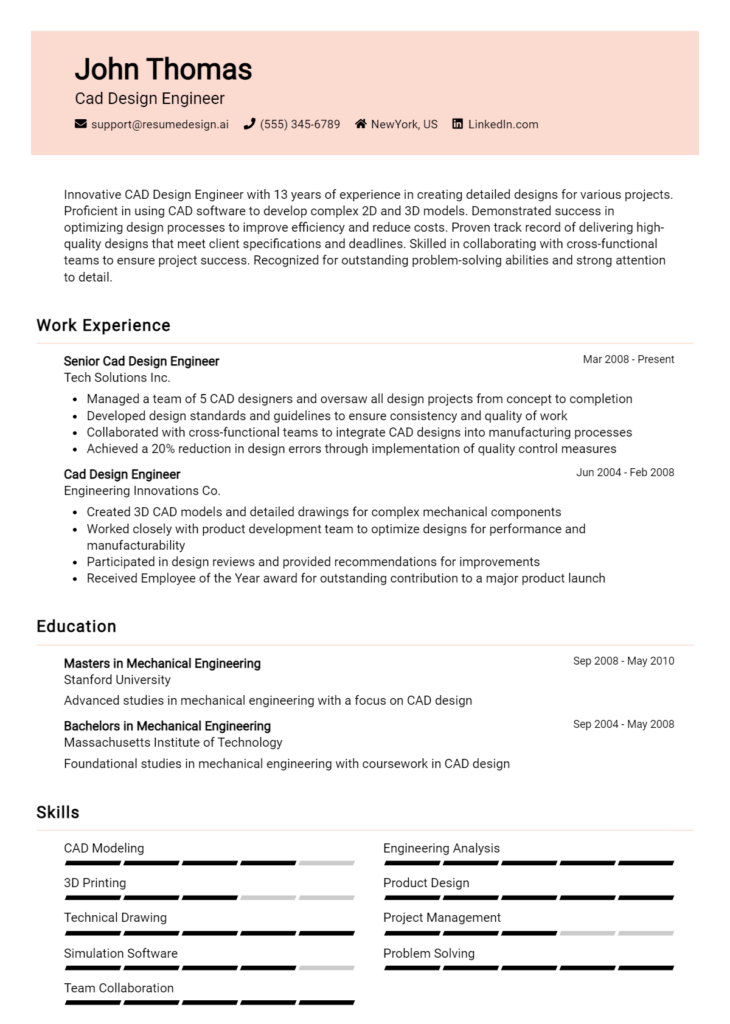Marine Engineer Core Responsibilities
Marine Engineers are responsible for the design, construction, and maintenance of marine vessels and structures, serving as a crucial link between various departments such as design, operations, and safety. They must possess strong technical knowledge, operational skills, and exceptional problem-solving abilities to effectively address challenges in marine environments. These competencies contribute significantly to the organization's overall goals, ensuring safety, efficiency, and innovation. A well-structured resume is essential to highlight these qualifications, showcasing a candidate's readiness to excel in this dynamic field.
Common Responsibilities Listed on Marine Engineer Resume
- Design and develop marine propulsion systems and equipment.
- Conduct inspections and maintenance of marine vessels.
- Ensure compliance with safety and regulatory standards.
- Collaborate with other engineering departments on project specifications.
- Perform troubleshooting and repair of mechanical systems.
- Manage technical documentation and project reports.
- Oversee installation and commissioning of marine equipment.
- Participate in research and development of new marine technologies.
- Conduct risk assessments and implement mitigation strategies.
- Provide technical support and training to crew members.
- Analyze performance data to optimize vessel operations.
High-Level Resume Tips for Marine Engineer Professionals
In the competitive field of marine engineering, a well-crafted resume is crucial for standing out among a pool of talented candidates. Your resume is often the first impression you make on potential employers, serving as a reflection of your skills, experiences, and achievements. It needs to convey not just your technical abilities, but also your accomplishments and contributions to previous roles. In this guide, we will provide practical and actionable resume tips specifically tailored for marine engineer professionals, ensuring that your document showcases your qualifications and makes a lasting impact.
Top Resume Tips for Marine Engineer Professionals
- Tailor your resume to the specific job description by using keywords and phrases that align with the employer's requirements.
- Highlight relevant experience by focusing on roles that directly pertain to marine engineering, including internships and co-op positions.
- Quantify your achievements with metrics, such as the percentage of efficiency improvements or the size of projects you managed.
- Showcase industry-specific skills, such as proficiency in CAD software, knowledge of marine regulations, and familiarity with vessel design.
- Include certifications and licenses relevant to marine engineering, such as a Professional Engineer (PE) license or STCW certification.
- Utilize a clean and professional format that enhances readability, ensuring that key information stands out to hiring managers.
- Incorporate a summary statement at the top of your resume that encapsulates your career objectives and key qualifications.
- Highlight any leadership or teamwork experiences, as collaboration is essential in marine engineering projects.
- Keep your resume concise, ideally one page, while ensuring that all pertinent information is included without unnecessary details.
By implementing these tips, marine engineer professionals can significantly increase their chances of landing a job in the field. A well-structured resume that effectively showcases skills and achievements will not only attract the attention of hiring managers but also demonstrate your commitment to excellence in the marine engineering industry.
Why Resume Headlines & Titles are Important for Marine Engineer
In the competitive field of marine engineering, a well-crafted resume headline or title is essential for capturing the attention of hiring managers. A strong headline provides a concise summary of a candidate's key qualifications, showcasing their unique skills and experiences in a way that resonates with potential employers. It serves as the first impression of a resume, making it critical that the headline is not only relevant to the job being applied for but also impactful enough to encourage a deeper review of the entire document. By distilling a candidate's essence into an engaging phrase, a compelling resume headline can significantly enhance their chances of standing out in a crowded applicant pool.
Best Practices for Crafting Resume Headlines for Marine Engineer
- Keep it concise: Aim for one impactful phrase that summarizes your qualifications.
- Be role-specific: Tailor the headline to the marine engineering position you are applying for.
- Highlight key strengths: Focus on your most relevant skills, experiences, or accomplishments.
- Use industry keywords: Incorporate terminology that is recognized in marine engineering.
- Avoid jargon: Ensure that the headline is easily understood by a broad audience.
- Showcase achievements: If possible, include quantifiable results to demonstrate your impact.
- Maintain professionalism: Keep the tone formal and appropriate for the industry.
- Revise and refine: Edit the headline multiple times for clarity and effectiveness.
Example Resume Headlines for Marine Engineer
Strong Resume Headlines
"Dynamic Marine Engineer with 10+ Years in Ship Design and Construction"
“Results-Driven Marine Engineer Specializing in Sustainable Marine Systems”
“Innovative Marine Engineering Expert with Proven Record in Project Management”
Weak Resume Headlines
“Marine Engineer Looking for a Job”
“Experienced Professional”
The strong headlines are effective because they immediately convey specific qualifications and achievements relevant to the marine engineering field, enticing hiring managers to read further. They are direct and tailored, reflecting the candidate's expertise and focus. In contrast, the weak headlines fail to impress due to their vagueness and lack of specificity; they do not provide any meaningful insight into the candidate's skills or experiences, making it easy for hiring managers to overlook them in favor of more compelling options.
Writing an Exceptional Marine Engineer Resume Summary
A well-crafted resume summary is crucial for Marine Engineers as it serves as the first impression for hiring managers. A strong summary succinctly highlights key skills, relevant experience, and notable accomplishments that align with the job role, effectively capturing attention in a competitive job market. By presenting a concise and impactful snapshot of qualifications, candidates can distinguish themselves from other applicants. Tailoring the summary to the specific job applied for further enhances its effectiveness, making it clear how the candidate can add value to the organization.
Best Practices for Writing a Marine Engineer Resume Summary
- Quantify Achievements: Use specific numbers and metrics to demonstrate the impact of your work.
- Focus on Relevant Skills: Highlight skills that are directly related to the position you are applying for.
- Tailor for the Job Description: Customize the summary to fit the specific requirements and keywords of the job listing.
- Keep It Concise: Aim for 2-4 sentences that effectively communicate your qualifications without being overly verbose.
- Highlight Key Accomplishments: Mention significant projects or successes that showcase your expertise and capabilities.
- Use Strong Action Verbs: Start sentences with powerful verbs to convey a sense of proactivity and expertise.
- Maintain Professional Tone: Ensure the summary reflects professionalism and aligns with industry standards.
- Showcase Problem-Solving Skills: Emphasize your ability to tackle challenges and deliver solutions in marine engineering contexts.
Example Marine Engineer Resume Summaries
Strong Resume Summaries
Results-driven Marine Engineer with over 8 years of experience in designing and optimizing propulsion systems, achieving a 20% increase in fuel efficiency on multiple vessel projects. Proven expertise in conducting rigorous performance assessments and implementing innovative solutions that reduce operational costs.
Dynamic Marine Engineer skilled in project management and systems integration, successfully leading a team that completed a $5 million offshore drilling project 3 months ahead of schedule. Recognized for exceptional problem-solving abilities and a commitment to safety and environmental standards.
Experienced Marine Engineer with a robust background in ship maintenance and repair, having reduced dry dock time by 30% through the implementation of proactive maintenance strategies. Proficient in CAD software and marine regulations, ensuring compliance and efficiency in all projects.
Weak Resume Summaries
Marine Engineer with experience in the field. I have worked on various projects and have some skills related to engineering.
Dedicated engineer looking to contribute to a marine company. I am a team player and have done some engineering work in the past.
The examples provided illustrate the distinction between strong and weak resume summaries. Strong summaries are specific, quantifiable, and directly relevant to the Marine Engineer role, showcasing measurable achievements and key skills. In contrast, weak summaries are vague, lacking in detail and impact, which fails to engage hiring managers or convey the candidate's true value in the marine engineering field.
Work Experience Section for Marine Engineer Resume
The work experience section of a Marine Engineer resume is critical in demonstrating a candidate's practical capabilities and achievements in the field. This section not only highlights the technical skills acquired through hands-on experience but also showcases the candidate's ability to manage teams, collaborate effectively, and deliver high-quality engineering solutions. By quantifying achievements and aligning work experience with industry standards, candidates can provide potential employers with clear evidence of their contributions and competencies, making them stand out in a competitive job market.
Best Practices for Marine Engineer Work Experience
- Focus on quantifiable results, such as percentage improvements or cost savings achieved in past projects.
- Use technical terminology relevant to marine engineering to showcase expertise.
- Highlight leadership roles and team management experiences in projects.
- Align work experience descriptions with industry standards and best practices.
- Emphasize collaboration with cross-functional teams to demonstrate teamwork skills.
- Include specific examples of complex engineering challenges and how they were overcome.
- Detail any certifications or training received in relation to previous roles.
- Utilize action verbs to convey a sense of proactivity and impact.
Example Work Experiences for Marine Engineer
Strong Experiences
- Led a team of 10 engineers in the successful overhaul of a 3000 HP marine propulsion system, resulting in a 20% increase in fuel efficiency.
- Implemented a new maintenance protocol that reduced downtime by 30% and saved the organization $150,000 annually.
- Collaborated with a multi-disciplinary team to design and launch a state-of-the-art underwater ROV, completing the project 3 months ahead of schedule.
- Managed the installation of advanced navigational systems on 15 vessels, improving operational accuracy by 25% while adhering to all regulatory standards.
Weak Experiences
- Worked on various marine projects without specifying any outcomes or contributions.
- Assisted with engineering tasks and performed general duties.
- Participated in team meetings and discussions.
- Involved in the maintenance of marine equipment without detailing specific improvements or responsibilities.
The examples categorized as strong experiences are effective because they detail specific achievements and quantifiable outcomes, showcasing the candidate’s technical leadership and collaborative efforts. In contrast, the weak experiences lack measurable results and clarity, failing to highlight the candidate's contributions or skills, which diminishes their impact on a potential employer.
Education and Certifications Section for Marine Engineer Resume
The Education and Certifications section of a Marine Engineer resume plays a crucial role in establishing the candidate's qualifications and expertise in the field. This section not only showcases the academic background that is foundational to a marine engineering career but also highlights industry-relevant certifications that demonstrate specialized knowledge and skills. By including relevant coursework, certifications, and any specialized training, candidates can enhance their credibility and show a commitment to continuous learning. This alignment with the job role is essential, as employers seek individuals who are well-prepared to meet the technical demands of marine engineering.
Best Practices for Marine Engineer Education and Certifications
- Include only relevant degrees and certifications that are applicable to marine engineering.
- List the most advanced credentials first, such as a Master's degree or specialized certifications.
- Provide details on relevant coursework that enhances your knowledge of marine systems and technologies.
- Highlight certifications from recognized industry organizations, such as the American Society of Mechanical Engineers (ASME) or the Society of Naval Architects and Marine Engineers (SNAME).
- Use clear and concise language to describe each qualification, avoiding unnecessary jargon.
- Update this section regularly to reflect new certifications or advanced training completed.
- Consider including any continuing education courses that demonstrate your commitment to staying current in the field.
- Format this section for easy readability, using bullet points and consistent styling.
Example Education and Certifications for Marine Engineer
Strong Examples
- Bachelor of Science in Marine Engineering, Massachusetts Maritime Academy, 2020
- Certified Marine Engineer (CME), National Maritime Certification Board, 2021
- Advanced Marine Propulsion Systems, Online Course, Coursera, 2022
- STCW Basic Safety Training Certification, 2023
Weak Examples
- Bachelor's Degree in Business Administration, University of XYZ, 2018
- Certification in Basic Computer Skills, 2019
- High School Diploma, ABC High School, 2016
- Outdated Marine Engineer License, 2015
The strong examples are considered relevant because they directly relate to marine engineering, showcasing both educational background and industry-recognized certifications. They align with the qualifications expected in the field, indicating a candidate who is well-prepared for the demands of the role. Conversely, the weak examples reflect qualifications that do not pertain to marine engineering, such as unrelated degrees or outdated certifications. These do not enhance the candidate's credibility and may suggest a lack of focus on the necessary skills and knowledge required for a successful career in marine engineering.
Top Skills & Keywords for Marine Engineer Resume
In the competitive field of marine engineering, a well-crafted resume is essential for standing out to potential employers. One of the most critical components of a successful resume is the inclusion of relevant skills. These skills not only demonstrate your technical expertise but also highlight your ability to work effectively in diverse environments. A solid mix of hard and soft skills can showcase your qualifications and readiness to tackle the unique challenges of marine engineering. By emphasizing these skills, you can provide a clear picture of your capabilities and potential contributions to a prospective employer.
Top Hard & Soft Skills for Marine Engineer
Soft Skills
- Problem-solving abilities
- Strong communication skills
- Team collaboration
- Adaptability to changing environments
- Critical thinking
- Time management
- Leadership qualities
- Attention to detail
- Project management
- Analytical mindset
- Creativity in design and engineering solutions
- Conflict resolution skills
- Customer service orientation
- Interpersonal skills
- Decision-making abilities
Hard Skills
- Proficiency in CAD software
- Knowledge of marine propulsion systems
- Familiarity with marine regulations and safety standards
- Competence in hydraulic and pneumatic systems
- Experience with maintenance and repair of marine equipment
- Understanding of fluid dynamics
- Ability to conduct marine surveys and inspections
- Expertise in electrical systems for marine applications
- Proficient in programming languages relevant to marine engineering
- Knowledge of materials science as applied to marine structures
- Familiarity with environmental and sustainability practices in marine engineering
- Ship design principles
- Data analysis and interpretation skills
- Experience with project costing and budgeting
- Understanding of automation and control systems
- Familiarity with welding and fabrication techniques
- Knowledge of HVAC systems in marine environments
- Proficiency in using simulation software for marine applications
For more information on how to effectively showcase your skills and work experience in your resume, consider exploring the resources available to enhance your application.
Stand Out with a Winning Marine Engineer Cover Letter
Dear [Hiring Manager's Name],
I am writing to express my interest in the Marine Engineer position at [Company Name] as advertised on [Job Board/Company Website]. With a Bachelor’s degree in Marine Engineering from [University Name] and over [X years] of experience in the maritime industry, I possess a robust understanding of marine systems and a proven track record of ensuring vessel safety, efficiency, and compliance with international regulations. My hands-on experience with engine room operations, maintenance, and repairs has equipped me with the practical skills and technical knowledge needed to excel in this role.
Throughout my career, I have been responsible for overseeing the installation and maintenance of various marine equipment, including propulsion systems, electrical systems, and safety devices. At [Previous Company Name], I successfully led a team that increased operational efficiency by [X%] through the implementation of a predictive maintenance program, which reduced downtime and improved overall vessel performance. I am adept at troubleshooting complex mechanical issues, performing feasibility studies for new projects, and collaborating with cross-functional teams to achieve optimal results. My dedication to safety and compliance ensures that all operations adhere to the highest industry standards.
I am particularly drawn to the innovative projects at [Company Name] and the commitment to sustainability within the marine sector. I am eager to contribute my skills in marine design and project management to support your mission of advancing marine technology while minimizing environmental impact. I am confident that my expertise in marine engineering, coupled with my passion for the industry, would make me a valuable asset to your team.
Thank you for considering my application. I look forward to the opportunity to discuss how my background, skills, and enthusiasm for marine engineering align with the goals of [Company Name]. I am excited about the possibility of contributing to your esteemed organization and am available for an interview at your earliest convenience.
Sincerely,
[Your Name]
[Your Contact Information]
[LinkedIn Profile or Website, if applicable]
Common Mistakes to Avoid in a Marine Engineer Resume
Crafting a resume as a Marine Engineer requires attention to detail and a strong understanding of the specific skills and experiences relevant to the maritime industry. Unfortunately, many candidates make common mistakes that can hinder their chances of landing an interview. By being aware of these pitfalls, you can create a more effective resume that showcases your qualifications and makes a lasting impression on potential employers.
Generic Objective Statements: Using a vague or generic objective statement can make your resume blend in with others. Tailor your objective to highlight your passion for marine engineering and your specific career goals.
Ignoring Keywords: Many employers use Applicant Tracking Systems (ATS) to filter resumes. Failing to include industry-specific keywords can result in your resume being overlooked. Carefully review job descriptions and incorporate relevant terms into your document.
Omitting Relevant Certifications: Marine engineering often requires specific certifications (e.g., STCW, SOLAS). Neglecting to list these can suggest a lack of qualifications. Ensure you highlight all relevant certifications prominently.
Inadequate Technical Skills Section: A marine engineer's resume should showcase technical skills such as CAD software proficiency, knowledge of marine systems, or troubleshooting abilities. Failing to include a comprehensive skills section can leave your technical capabilities unclear.
Lack of Quantifiable Achievements: Employers seek measurable results. Instead of merely listing responsibilities, include quantifiable achievements that demonstrate your impact, such as improving efficiency or reducing costs on a project.
Overly Complex Language: While technical jargon is important, using overly complex language or acronyms without explanation can confuse hiring managers. Aim for clarity and ensure that even non-technical readers can understand your accomplishments.
Ignoring Professional Development: Continuous learning is vital in marine engineering. Not mentioning workshops, seminars, or additional training can make it seem like you aren’t keeping up with industry trends. Include any relevant professional development activities.
Poor Formatting: A cluttered or unprofessional format can detract from the content of your resume. Use clear headings, bullet points, and consistent fonts to make your resume easy to read and visually appealing.
Conclusion
As a Marine Engineer, your expertise in designing, constructing, and maintaining ships, submarines, and other marine vessels is crucial in ensuring maritime safety and efficiency. Throughout this article, we have explored various aspects of the Marine Engineer role, including the necessary educational background, essential skills, and the importance of hands-on experience in the field.
We also discussed the evolving landscape of marine engineering, touched on the significance of staying updated with technological advancements, and highlighted the growing demand for sustainable practices within the industry.
In conclusion, it’s vital to present yourself effectively in your job applications. Take a moment to review your Marine Engineer resume to ensure it accurately reflects your qualifications and experiences. To assist you in this process, we recommend utilizing resources such as resume templates, a user-friendly resume builder, a collection of tailored resume examples, and professionally crafted cover letter templates. Start refining your resume today to stand out in the competitive marine engineering job market!

